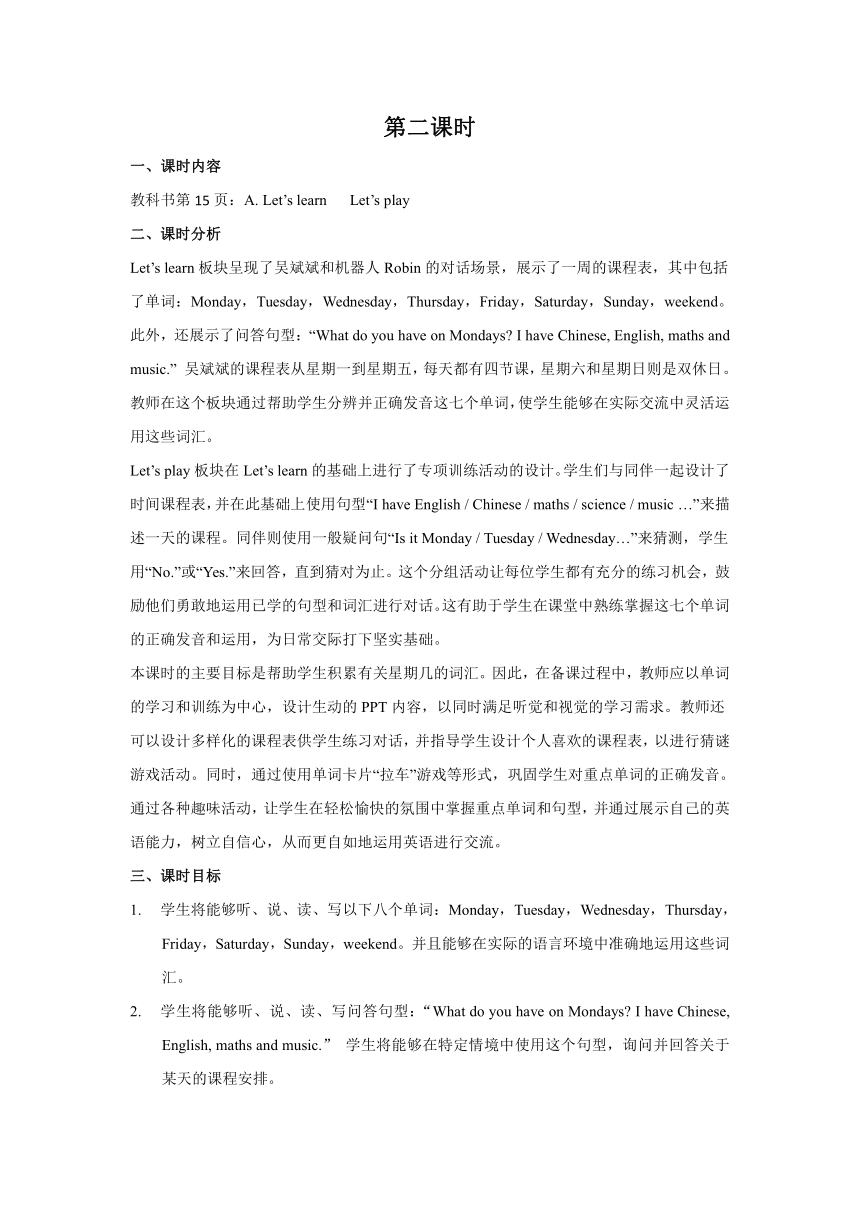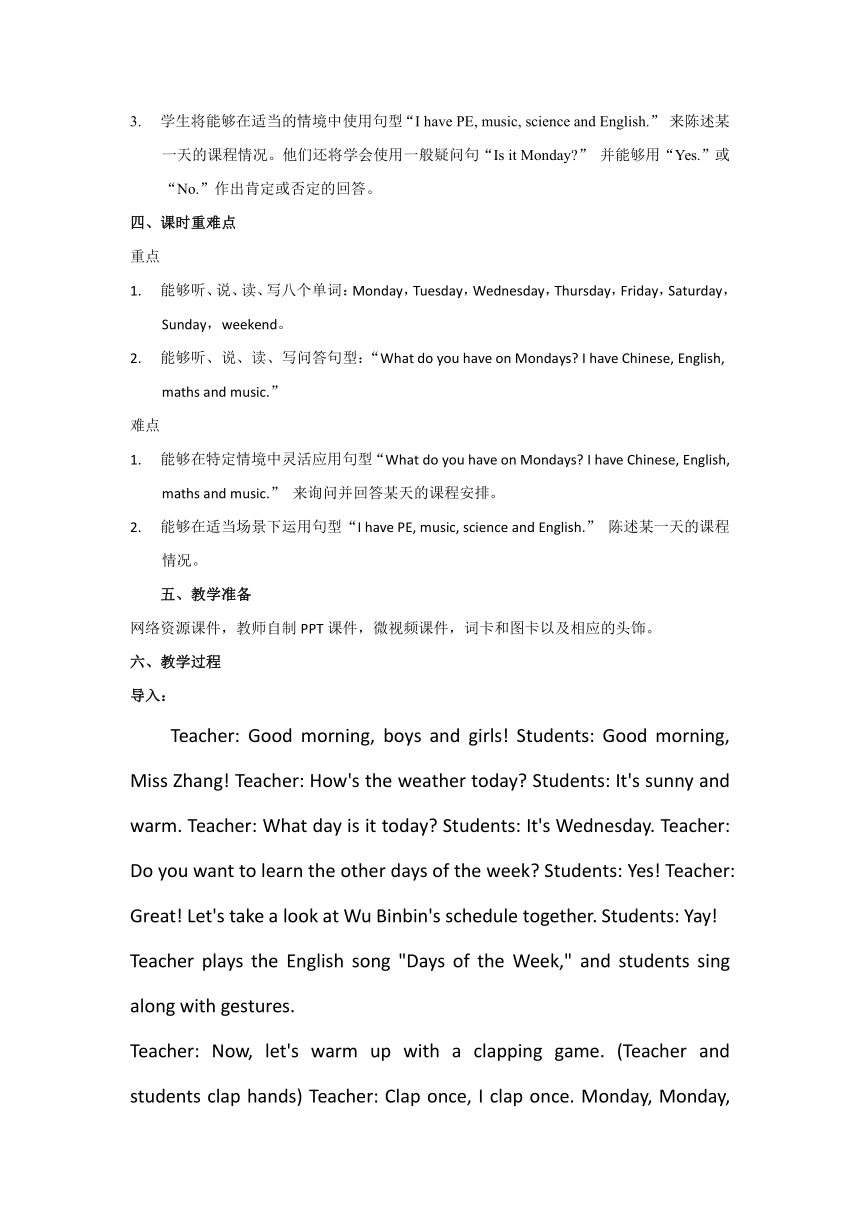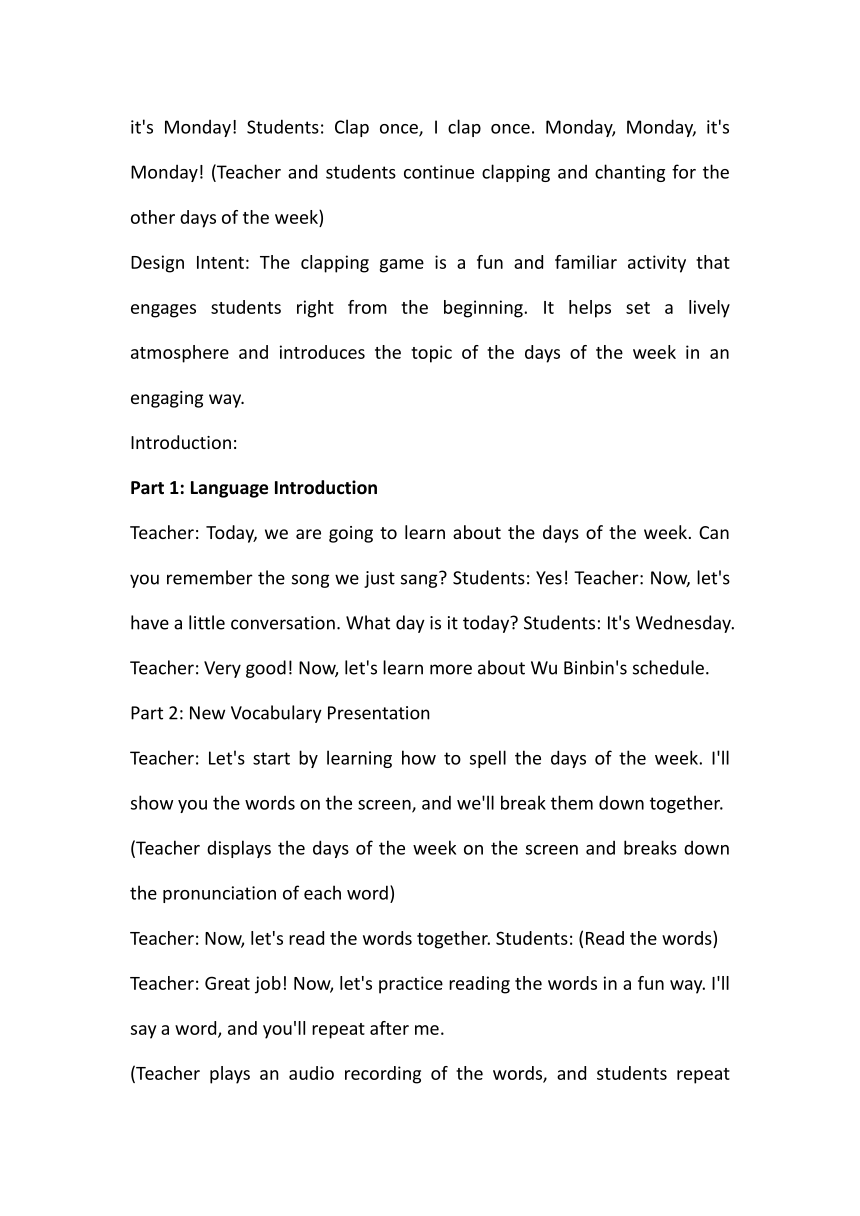Unit 2 My week Part A Let’s learn 教案
文档属性
| 名称 | Unit 2 My week Part A Let’s learn 教案 |

|
|
| 格式 | docx | ||
| 文件大小 | 28.3KB | ||
| 资源类型 | 教案 | ||
| 版本资源 | 人教版(PEP) | ||
| 科目 | 英语 | ||
| 更新时间 | 2023-08-26 00:00:00 | ||
图片预览



文档简介
第二课时
一、课时内容
教科书第15页:A. Let’s learn Let’s play
二、课时分析
Let’s learn板块呈现了吴斌斌和机器人Robin的对话场景,展示了一周的课程表,其中包括了单词:Monday,Tuesday,Wednesday,Thursday,Friday,Saturday,Sunday,weekend。此外,还展示了问答句型:“What do you have on Mondays I have Chinese, English, maths and music.” 吴斌斌的课程表从星期一到星期五,每天都有四节课,星期六和星期日则是双休日。教师在这个板块通过帮助学生分辨并正确发音这七个单词,使学生能够在实际交流中灵活运用这些词汇。
Let’s play板块在Let’s learn的基础上进行了专项训练活动的设计。学生们与同伴一起设计了时间课程表,并在此基础上使用句型“I have English / Chinese / maths / science / music …”来描述一天的课程。同伴则使用一般疑问句“Is it Monday / Tuesday / Wednesday…”来猜测,学生用“No.”或“Yes.”来回答,直到猜对为止。这个分组活动让每位学生都有充分的练习机会,鼓励他们勇敢地运用已学的句型和词汇进行对话。这有助于学生在课堂中熟练掌握这七个单词的正确发音和运用,为日常交际打下坚实基础。
本课时的主要目标是帮助学生积累有关星期几的词汇。因此,在备课过程中,教师应以单词的学习和训练为中心,设计生动的PPT内容,以同时满足听觉和视觉的学习需求。教师还可以设计多样化的课程表供学生练习对话,并指导学生设计个人喜欢的课程表,以进行猜谜游戏活动。同时,通过使用单词卡片“拉车”游戏等形式,巩固学生对重点单词的正确发音。通过各种趣味活动,让学生在轻松愉快的氛围中掌握重点单词和句型,并通过展示自己的英语能力,树立自信心,从而更自如地运用英语进行交流。
三、课时目标
学生将能够听、说、读、写以下八个单词:Monday,Tuesday,Wednesday,Thursday,Friday,Saturday,Sunday,weekend。并且能够在实际的语言环境中准确地运用这些词汇。
学生将能够听、说、读、写问答句型:“What do you have on Mondays I have Chinese, English, maths and music.” 学生将能够在特定情境中使用这个句型,询问并回答关于某天的课程安排。
学生将能够在适当的情境中使用句型“I have PE, music, science and English.” 来陈述某一天的课程情况。他们还将学会使用一般疑问句“Is it Monday ” 并能够用“Yes.”或“No.”作出肯定或否定的回答。
四、课时重难点
重点
能够听、说、读、写八个单词:Monday,Tuesday,Wednesday,Thursday,Friday,Saturday,Sunday,weekend。
能够听、说、读、写问答句型:“What do you have on Mondays I have Chinese, English, maths and music.”
难点
能够在特定情境中灵活应用句型“What do you have on Mondays I have Chinese, English, maths and music.” 来询问并回答某天的课程安排。
能够在适当场景下运用句型“I have PE, music, science and English.” 陈述某一天的课程情况。
五、教学准备
网络资源课件,教师自制PPT课件,微视频课件,词卡和图卡以及相应的头饰。
六、教学过程
导入:
Teacher: Good morning, boys and girls! Students: Good morning, Miss Zhang! Teacher: How's the weather today Students: It's sunny and warm. Teacher: What day is it today Students: It's Wednesday. Teacher: Do you want to learn the other days of the week Students: Yes! Teacher: Great! Let's take a look at Wu Binbin's schedule together. Students: Yay!
Teacher plays the English song "Days of the Week," and students sing along with gestures.
Teacher: Now, let's warm up with a clapping game. (Teacher and students clap hands) Teacher: Clap once, I clap once. Monday, Monday, it's Monday! Students: Clap once, I clap once. Monday, Monday, it's Monday! (Teacher and students continue clapping and chanting for the other days of the week)
Design Intent: The clapping game is a fun and familiar activity that engages students right from the beginning. It helps set a lively atmosphere and introduces the topic of the days of the week in an engaging way.
Introduction:
Part 1: Language Introduction
Teacher: Today, we are going to learn about the days of the week. Can you remember the song we just sang Students: Yes! Teacher: Now, let's have a little conversation. What day is it today Students: It's Wednesday. Teacher: Very good! Now, let's learn more about Wu Binbin's schedule.
Part 2: New Vocabulary Presentation
Teacher: Let's start by learning how to spell the days of the week. I'll show you the words on the screen, and we'll break them down together.
(Teacher displays the days of the week on the screen and breaks down the pronunciation of each word)
Teacher: Now, let's read the words together. Students: (Read the words)
Teacher: Great job! Now, let's practice reading the words in a fun way. I'll say a word, and you'll repeat after me.
(Teacher plays an audio recording of the words, and students repeat after each word)
Teacher: Excellent! Let's play a game called "Train Reading." We'll read the words like a train passing each student. Remember to pass the "word cards" to the next student after you read.
Design Intent: By engaging students in various interactive activities, such as breaking down words, repeating after the teacher, and playing "Train Reading," the teacher ensures active participation and reinforces the pronunciation and recognition of the new vocabulary.
Part 3: Learning Dialogue Patterns
Teacher: Now, let's practice using the new words in sentences. Repeat after me:
Teacher: What do you have on Mondays Students: What do you have on Mondays Teacher: I have Chinese, English, maths, and music. Students: I have Chinese, English, maths, and music.
Teacher: Fantastic! Let's do a role-playing activity. Some of you will be Robin, and others will be Wu Binbin. Robin, ask about Wu Binbin's schedule for different days of the week.
Design Intent: Through role-playing and repetition, students get more comfortable with the dialogue patterns and sentence structures, improving their speaking and listening skills.
Part 4: Practice Activities
Activity 1: Design Your Schedule
Teacher: Now, I want you to work in pairs and design your own schedules using the days of the week and the subjects we've learned. Then, take turns asking and answering about each other's schedules.
Activity 2: Hammer the Course Buttons
Teacher: Get ready for a fun game! We have colorful balloons with the days of the week on them. And we have course buttons with subjects. When I say a day of the week, you need to hit the correct subject button! But be careful, you only have a few seconds!
Design Intent: These practice activities encourage students to actively use the newly acquired vocabulary and sentence patterns in a playful and engaging way.
Conclusion:
Teacher: Well done, everyone! Today, we've learned about the days of the week, how to ask about schedules, and how to talk about our favorite subjects. I'm so proud of your progress! Keep practicing, and I'm sure you'll become English experts in no time!
Design Intent: The conclusion wraps up the lesson and reinforces the key takeaways, encouraging students to continue practicing and building confidence in their English skills.
Remember, keeping the class interactive and engaging is crucial for young learners. Incorporating games, songs, and collaborative activities can make the learning experience enjoyable while helping students absorb the content effectively.
板书设计
第二课时
重点单词:Monday Tuesday Wednesday Thursday Friday
Saturday Sunday weekend
重点句型:—What do you have on Mondays
—I have Chinese, English, maths and music.
一、课时内容
教科书第15页:A. Let’s learn Let’s play
二、课时分析
Let’s learn板块呈现了吴斌斌和机器人Robin的对话场景,展示了一周的课程表,其中包括了单词:Monday,Tuesday,Wednesday,Thursday,Friday,Saturday,Sunday,weekend。此外,还展示了问答句型:“What do you have on Mondays I have Chinese, English, maths and music.” 吴斌斌的课程表从星期一到星期五,每天都有四节课,星期六和星期日则是双休日。教师在这个板块通过帮助学生分辨并正确发音这七个单词,使学生能够在实际交流中灵活运用这些词汇。
Let’s play板块在Let’s learn的基础上进行了专项训练活动的设计。学生们与同伴一起设计了时间课程表,并在此基础上使用句型“I have English / Chinese / maths / science / music …”来描述一天的课程。同伴则使用一般疑问句“Is it Monday / Tuesday / Wednesday…”来猜测,学生用“No.”或“Yes.”来回答,直到猜对为止。这个分组活动让每位学生都有充分的练习机会,鼓励他们勇敢地运用已学的句型和词汇进行对话。这有助于学生在课堂中熟练掌握这七个单词的正确发音和运用,为日常交际打下坚实基础。
本课时的主要目标是帮助学生积累有关星期几的词汇。因此,在备课过程中,教师应以单词的学习和训练为中心,设计生动的PPT内容,以同时满足听觉和视觉的学习需求。教师还可以设计多样化的课程表供学生练习对话,并指导学生设计个人喜欢的课程表,以进行猜谜游戏活动。同时,通过使用单词卡片“拉车”游戏等形式,巩固学生对重点单词的正确发音。通过各种趣味活动,让学生在轻松愉快的氛围中掌握重点单词和句型,并通过展示自己的英语能力,树立自信心,从而更自如地运用英语进行交流。
三、课时目标
学生将能够听、说、读、写以下八个单词:Monday,Tuesday,Wednesday,Thursday,Friday,Saturday,Sunday,weekend。并且能够在实际的语言环境中准确地运用这些词汇。
学生将能够听、说、读、写问答句型:“What do you have on Mondays I have Chinese, English, maths and music.” 学生将能够在特定情境中使用这个句型,询问并回答关于某天的课程安排。
学生将能够在适当的情境中使用句型“I have PE, music, science and English.” 来陈述某一天的课程情况。他们还将学会使用一般疑问句“Is it Monday ” 并能够用“Yes.”或“No.”作出肯定或否定的回答。
四、课时重难点
重点
能够听、说、读、写八个单词:Monday,Tuesday,Wednesday,Thursday,Friday,Saturday,Sunday,weekend。
能够听、说、读、写问答句型:“What do you have on Mondays I have Chinese, English, maths and music.”
难点
能够在特定情境中灵活应用句型“What do you have on Mondays I have Chinese, English, maths and music.” 来询问并回答某天的课程安排。
能够在适当场景下运用句型“I have PE, music, science and English.” 陈述某一天的课程情况。
五、教学准备
网络资源课件,教师自制PPT课件,微视频课件,词卡和图卡以及相应的头饰。
六、教学过程
导入:
Teacher: Good morning, boys and girls! Students: Good morning, Miss Zhang! Teacher: How's the weather today Students: It's sunny and warm. Teacher: What day is it today Students: It's Wednesday. Teacher: Do you want to learn the other days of the week Students: Yes! Teacher: Great! Let's take a look at Wu Binbin's schedule together. Students: Yay!
Teacher plays the English song "Days of the Week," and students sing along with gestures.
Teacher: Now, let's warm up with a clapping game. (Teacher and students clap hands) Teacher: Clap once, I clap once. Monday, Monday, it's Monday! Students: Clap once, I clap once. Monday, Monday, it's Monday! (Teacher and students continue clapping and chanting for the other days of the week)
Design Intent: The clapping game is a fun and familiar activity that engages students right from the beginning. It helps set a lively atmosphere and introduces the topic of the days of the week in an engaging way.
Introduction:
Part 1: Language Introduction
Teacher: Today, we are going to learn about the days of the week. Can you remember the song we just sang Students: Yes! Teacher: Now, let's have a little conversation. What day is it today Students: It's Wednesday. Teacher: Very good! Now, let's learn more about Wu Binbin's schedule.
Part 2: New Vocabulary Presentation
Teacher: Let's start by learning how to spell the days of the week. I'll show you the words on the screen, and we'll break them down together.
(Teacher displays the days of the week on the screen and breaks down the pronunciation of each word)
Teacher: Now, let's read the words together. Students: (Read the words)
Teacher: Great job! Now, let's practice reading the words in a fun way. I'll say a word, and you'll repeat after me.
(Teacher plays an audio recording of the words, and students repeat after each word)
Teacher: Excellent! Let's play a game called "Train Reading." We'll read the words like a train passing each student. Remember to pass the "word cards" to the next student after you read.
Design Intent: By engaging students in various interactive activities, such as breaking down words, repeating after the teacher, and playing "Train Reading," the teacher ensures active participation and reinforces the pronunciation and recognition of the new vocabulary.
Part 3: Learning Dialogue Patterns
Teacher: Now, let's practice using the new words in sentences. Repeat after me:
Teacher: What do you have on Mondays Students: What do you have on Mondays Teacher: I have Chinese, English, maths, and music. Students: I have Chinese, English, maths, and music.
Teacher: Fantastic! Let's do a role-playing activity. Some of you will be Robin, and others will be Wu Binbin. Robin, ask about Wu Binbin's schedule for different days of the week.
Design Intent: Through role-playing and repetition, students get more comfortable with the dialogue patterns and sentence structures, improving their speaking and listening skills.
Part 4: Practice Activities
Activity 1: Design Your Schedule
Teacher: Now, I want you to work in pairs and design your own schedules using the days of the week and the subjects we've learned. Then, take turns asking and answering about each other's schedules.
Activity 2: Hammer the Course Buttons
Teacher: Get ready for a fun game! We have colorful balloons with the days of the week on them. And we have course buttons with subjects. When I say a day of the week, you need to hit the correct subject button! But be careful, you only have a few seconds!
Design Intent: These practice activities encourage students to actively use the newly acquired vocabulary and sentence patterns in a playful and engaging way.
Conclusion:
Teacher: Well done, everyone! Today, we've learned about the days of the week, how to ask about schedules, and how to talk about our favorite subjects. I'm so proud of your progress! Keep practicing, and I'm sure you'll become English experts in no time!
Design Intent: The conclusion wraps up the lesson and reinforces the key takeaways, encouraging students to continue practicing and building confidence in their English skills.
Remember, keeping the class interactive and engaging is crucial for young learners. Incorporating games, songs, and collaborative activities can make the learning experience enjoyable while helping students absorb the content effectively.
板书设计
第二课时
重点单词:Monday Tuesday Wednesday Thursday Friday
Saturday Sunday weekend
重点句型:—What do you have on Mondays
—I have Chinese, English, maths and music.
